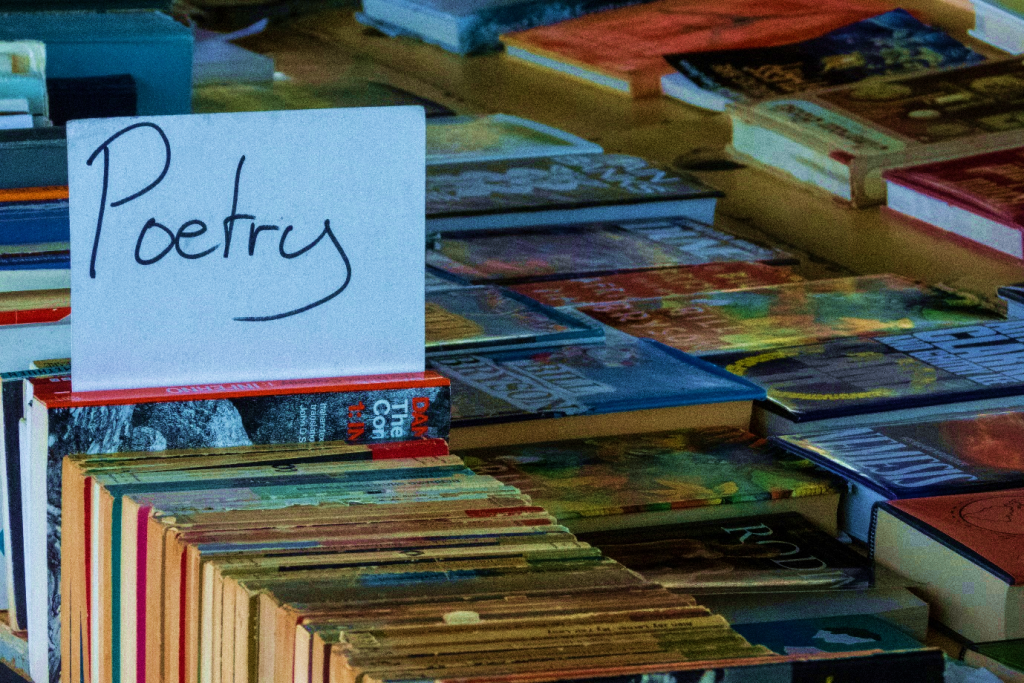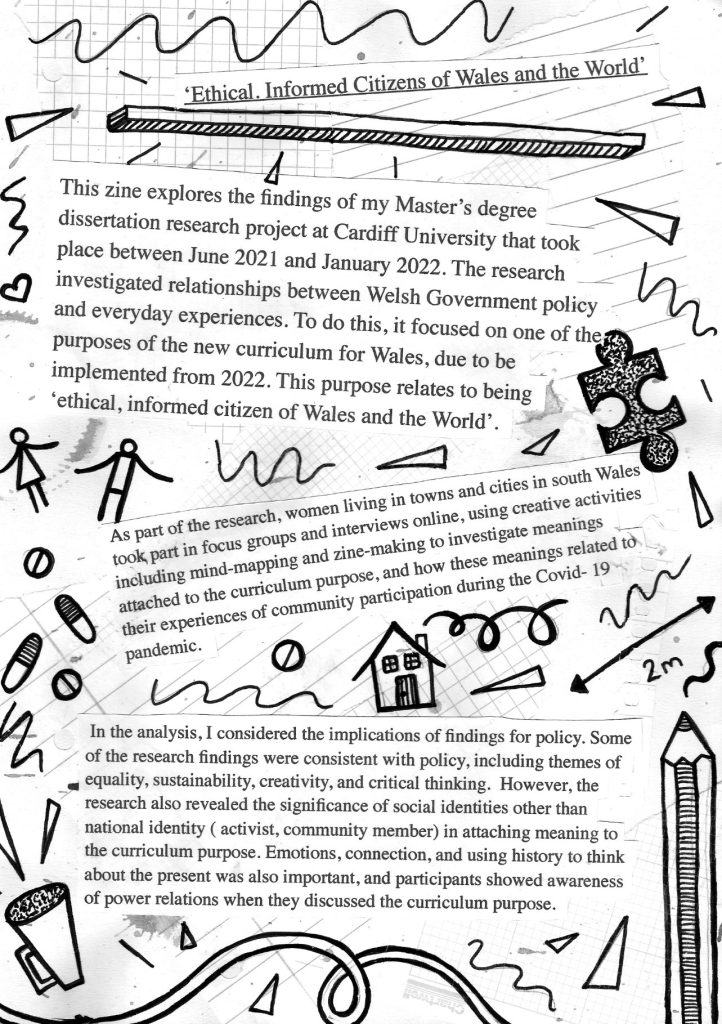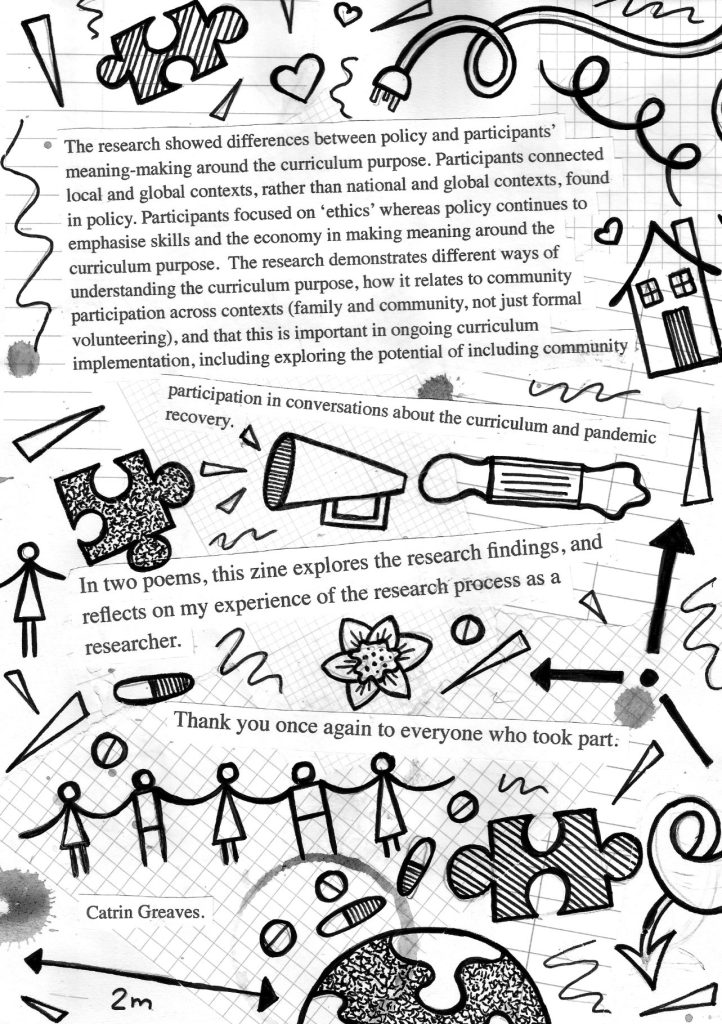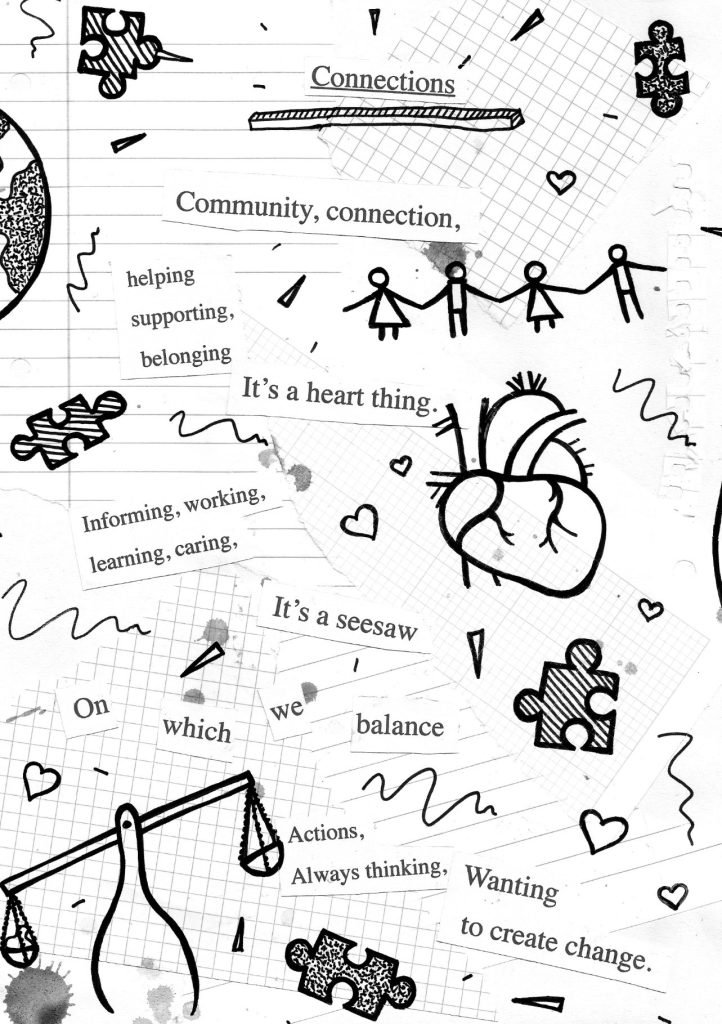Uses for poetry in research: communicating research findings and aiding reflexivity.

Hello, I’m the new editor of the Methods blog, and in this post I give some insight into the types of methods that I like to use in my own research work.
I may have dropped out of an English degree years ago, but in this blog, I provide some insight into how I’ve kept up my passion for creative writing despite my little detour into social sciences…
I’m an ESRC DTP funded PhD student who has completed the MSc in Social Science Research Methods ( quite a task under lockdown!). My MSc dissertation research explored women’s experiences of community participation during the pandemic, and how they might shed light on policy surrounding the new curriculum for Wales: being an ‘ethical, informed citizen of Wales and the World’ (Welsh Government 2020).
I used focus groups facilitated through mind-mapping and zine-making, as well as interviews to uncover participants’ meaning making around curriculum policy and their experiences of community participation. I found that the idea of being ‘ethical’ was particularly significant for participants, and they drew on a range of resources such as social identity and global citizenship in making meaning of their experiences in community settings, contradicting the economic focus and sense of national citizenship presented by Welsh Government curriculum policy.
Most of my participants, recruited through organisations involved in volunteering, were unfamiliar with academic research. I wanted to convey my findings in an accessible and exciting way. On way in which I did this was through using visual ways of gathering and presenting data, as it is an accessible format: Visual data should be ‘multivocal’ and therefore able to speak to a range of audiences (Banks 2011:94). I worked with an illustrator to create a zine to distribute to participants, reporting research findings. This meant that the zine was constructed by multiple voices: myself, the illustrator, and participants. Zines can be used to ‘curate ideas and thoughts’, leading to deeper reflection (Vong 2016:63), which was very useful for me in paying attention to my own position within the research process and commenting on my reflexivity in my methods chapter. Within the zine format, I used poetry to serve different purposes over the course of my research, including reflecting on the research process, getting to know my data, and presenting findings to participants.
Here’s an extract showing how my poetry was incorporated into the zine distributed to participants.



Zine distributed to research participants. The zine was made by myself, Catrin Greaves, and illustrator Gemma Williams, with contributions from research participants.
The zine included two poems which I wrote in response to my research. The first poem, ‘Connections’, conveys my research findings, such as identities that participants drew on (‘feminist, activist’) as well as the significance that they ascribed to connecting with others, reflected in my choice of title, ‘Connections’. To construct this poem, I used data from my interview and focus group transcripts, as a way of including participants’ voices. This was also very useful for me in getting to know my data more deeply. I wrote the second poem, ‘Reflections from a Zoom screen’, as a tool to aid my own reflexivity and learning from this research experience, by incorporating my own words from the data as a way to reflect on how I had conducted the research.
Two poems: ‘Connections’, and ‘Reflections from a Zoom screen’. Data from my research is highlighted in bold.
Connections
Community, connection,
helping
supporting,
belonging
It’s a heart thing.
Informing, working,
learning, caring,
It’s a seesaw
On which we balance
Actions,
Always thinking,
Wanting
to create change.
A compass to guide us
Into the new and unknown.
Headlines blaring,
Adapting, changing,
Risk taking
Knitting a net
Of conversation,
connecting
Feeling
For family, neighbours,
Friends,
Through fast wires and flickering screens
Part of a whole.
Feminist
Climate Activist
Neighbour, daughter, carer
Acting a role
In our communities, country,
continent
A globe
feverish with crises
But we are wanting
To create change.
It fueled my passion,
I will persist
I realised the power
Of transcending boundaries
Of geography
Through the patchwork squares of a screen-
Words are threads,
Weaving the warm glow
of windows to
Wales and the world.
It’s great to see you all,
And I feel so happy today.
But,
put your own oxygen mask on first.
Be creative, take care of yourself.
Take time.
Travel back through tides
Reflect,
learn from those who came
before us,
Connect
The quiet streets of your hometown
With the wider seas of change
Reflect
On how you belong
How you are part of something bigger.
(Catrin Greaves and research participants, July to August 2021)
Communicating Findings
This poem provides a summary of research findings, including the prominent themes of emotion (‘a heart thing’) and connection, and participants’ references to ‘ethical’ decision making and community participation across areas of social life, including family and community. The use of verbs (‘thinking’, ‘adapting’, ‘changing’) reflects participants’ emphasis on action and active citizenship, including in formal volunteering contexts or in terms of lifestyle (for example, Kayleigh*’s ‘ethical’ shopping for chocolate). I have also included references to identities which were significant for participants: ‘feminist, activist’, which was interesting, as policy focused more strongly on ‘national’ identity. Incorporating metaphors including that of a ‘seesaw’ and a ‘compass’ reflects participants’ awareness of the complexities of ‘ethical’ citizenship including difficulties of decision making. Using the first person, I hoped to elevate participants’ voices within my research, which was significant for my feminist approach, focusing on women, who have arguably been ignored in terms of citizenship research (Lister 2007:53). Ending the poem with the line ‘part of something bigger’, taken from Rachel*’s zine, I hoped to communicate how participants connected their experiences to wider global issues, for example, Angharad* connected her social media volunteering with a gender equality charity to wider issues of gender inequality and violence against women, which had featured prominently in the news around the time of her participation. I next examine how writing poetry helped me in my reflexivity as a researcher.
Reflexivity
Reflections from a Zoom screen
I have been looking at this idea from the curriculum of being an ethical and informed citizen of Wales and the world.
During the pandemic, I got more involved in my community.
I packed lunches,
waited in queues for someone else’s medicines,
added their groceries to my shopping list….
Why did I do this?
I wondered what this purpose could mean
in our new world of
Lockdown, empty streets,
Thursday clapping for carers,
Drum beats.
A time of change.
And what has happened to those
Who beat a weekly path?
to charity shops,
group meetings?
And what is already known about this?
And what does the government say?
But they are still busy
they’ve just found a new way…
So, what I was going to ask you to do was for 5 minutes, make a mind map about what you think about this idea of being an ethical or informed citizen of Wales and the world. it’s just your initial reactions….
Do you think of the headlines blaring from a laptop screen?
Or that press conference from a screen obscuring
the untidy living room
Of a Welsh Senedd member?
Do you think of the warm lights?
of your own home?
Or of clashing cries from
The distant past…
Do you think of a world that’s yet unknown?
Like the reports flashing from the government website?
And what does it mean to be a citizen?
And what kind of participation
Is important to you?
There is no right or wrong way of doing it. it’s up to you how you organise the words on the page… if something is particularly important to you, you might want to write more about it…
And I will write down my thoughts
I want you to have a choice,
a voice,
But I know it can be hard
to know what to do,
Across the distance of a screen.
When you make a zine, you can include what you want.
You can write, or draw, or…
I’m not very good at drawing,
but I want to try something new.
Are you ok, you cut out a bit there…?
(No response).
This process has been
Challenging
I’m expanding
My ways of
Constructing
Producing
I’ve found new ways of
Thinking, reflecting,
And
The time has gone quickly.
And there’s so much more to say,
It can’t fit into the squares of a Zoom call
But
If you want, you can send me photos of what you made,
And I really appreciate your time.
This process has helped me
in recognising
Empathising
It’s been
Surprising
And I’ve learnt about
History and homes, and creativity and care,
And connecting
the harmonising chords
Between community, country, continent
Between Wales and the World.
(Catrin Greaves, November 2021)
In this poem, I reflected on the research process. I acknowledged difficulties of researching online, using extracts from what I had said to participants during data collection (‘you cut out a bit there’). I considered my learning from this process (‘new ways of thinking’), and how my own experiences steered the directions of the research (‘I packed lunches… why did I do this?’).
Using a range of tools (such as poetry) to aid reflexivity may be particularly significant to feminist and collaborative research, through taking into account ethical considerations such as attention to power dynamics within the research process (Linabary et al 2021: 720). I hoped to demonstrate to participants how I felt about the research as a form of transparency as an ethical obligation of working with young participants who may not be familiar with research processes. Mutual emotions and experiences may be a way of creating connections between researchers and participants (McDowell 1992:405), which was important to me in making participating in the research a fun and rewarding experience for participants. I also hoped that sharing my experience of the research with participants through poetry was a form of transparency, which could also increase engagement with research (Moravcsik 2019). This was important to me because of my research topic of exploring everyday experiences in relation to policy.
I am now in the first year of my PhD. I hope to continue to use poetry or other creative writing to communicate research findings and aid my reflection. I hope to build on this and further embed creative writing into my PhD research. I have started to do this by writing a poem for every chapter of my thesis, as a way of focusing on my structure and communicating the key messages of each chapter. As editor of this blog, I am looking forward to learning about a wide range of methods used across the DTP. Diolch!
If you are interested in contributing to the Methods Blog, please email me: greavescm1@Cardiff.ac.uk.
Reference list
Banks, M 2011. Using Visual Data in Qualitative Research. [no date]. Available at: https://methods.sagepub.com/book/using-visual-data-in-qualitative-research [Accessed: 31 January 2022].
Cahnmann, M. 2003. The Craft, Practice, and Possibility of Poetry in Educational Research. Educational researcher 32(3), pp. 29–36. Available at: https://doi.org/10.3102/0013189X032003029.
Lister, R. 2007. Inclusive Citizenship: Realizing the Potential. Citizenship Studies 11(1), pp. 49–61. Available at: https://doi.org/10.1080/13621020601099856.
McDowell, L. 1992. Doing Gender: Feminism, Feminists and Research Methods in Human Geography. Transactions of the Institute of British Geographers 17(4), p. 399. doi: 10.2307/622707.
Moravcsik, A. 2019. Transparency in Qualitative Research. Available at: https://methods-sagepub-com.abc.cardiff.ac.uk/base/download/FoundationEntry/transparency-in-qualitative-research.
Vong, S. 2016. Reporting or Reconstructing? The Zine as a Medium for Reflecting on Research Experiences. Communications in Information Literacy 10(1), p. 3. Available at: https://pdxscholar.library.pdx.edu/comminfolit/vol10/iss1/3/ [Accessed: 31 January 2022].
Welsh Government 2020. Curriculum for Wales: overview | GOV.WALES. Available at: https://gov.wales/curriculum-wales-overview.